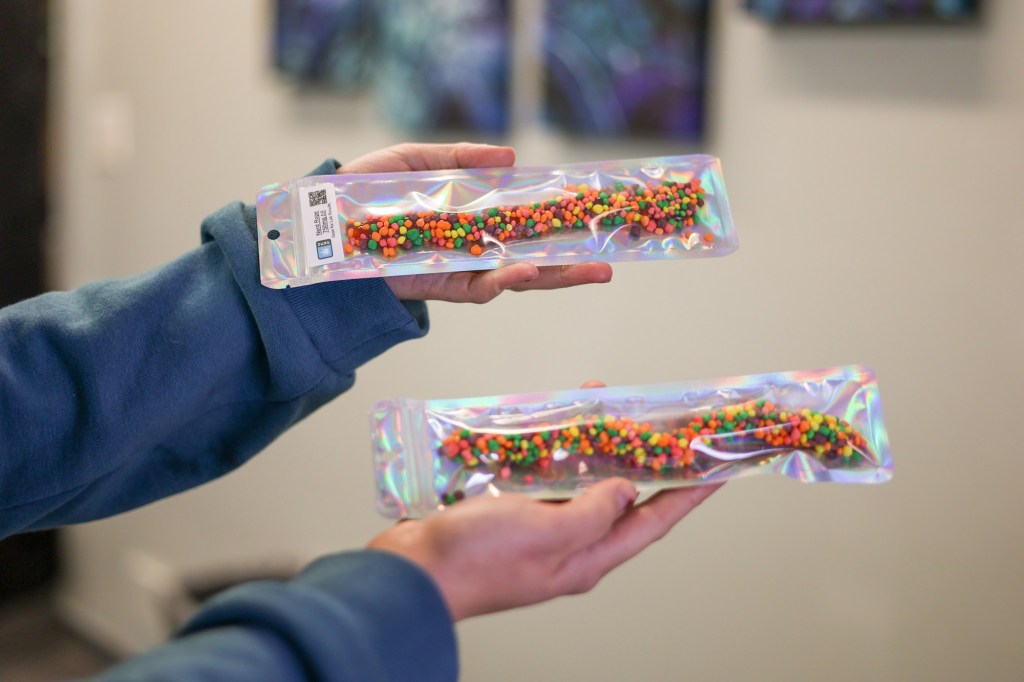Pennsylvania’s hemp industry is reeling after a provision quietly tucked into the recent legislation to end the record-setting government shutdown effectively outlawed many hemp-derived products now being sold in stores across the state and country.
The provision, which closes what supporters describe as a “loophole” in a 2018 farm bill that legalized many intoxicating THC products, makes any hemp-derived products containing more than 0.4 milligrams of total THC per container illegal effective Nov. 13, 2026.
The move was welcomed by those who argue the loophole inadvertently launched an industry that began marketing intoxicating substances, such as Delta-8 THC, in brightly colored, cartoonish packages designed to appeal to teens.
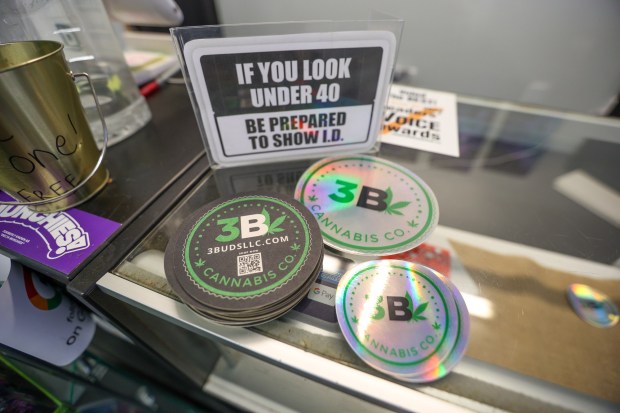 3BUDS in Wyoming on Wednesday, Nov. 19, 2025. (JASON ARDAN / STAFF PHOTOGRAPHER)
3BUDS in Wyoming on Wednesday, Nov. 19, 2025. (JASON ARDAN / STAFF PHOTOGRAPHER)
But industry insiders warn the effective ban could affect a wide range of products, including CBD oils, and could mark the death knell for a multi-billion-dollar industry.
“Likely, if they get this provision to stick, all the family businesses — not just retail stores but distributors, gas stations, farmers — they’re all going to be either shutting down or looking to grow something else,” said Hunter Smetana, co-owner of 3BUDS LLC in Wyoming Borough. “This is a multi-billion industry that could totally go under because of this.”
Industry advocates are now lobbying for increased regulation of their products in an effort to prevent an outright ban from taking effect.
“We’re trying to associate a hemp regulatory framework in the state of Pennsylvania that essentially allows us to coexist with impending adult-use legalization or a market that’s here now that can be regulated, taxed and controlled,” said Jake Sitler, president of the Pennsylvania Hemp and Cannabis Guild. “If these products go away the black market is going to explode, and it’s just going to go underground.”
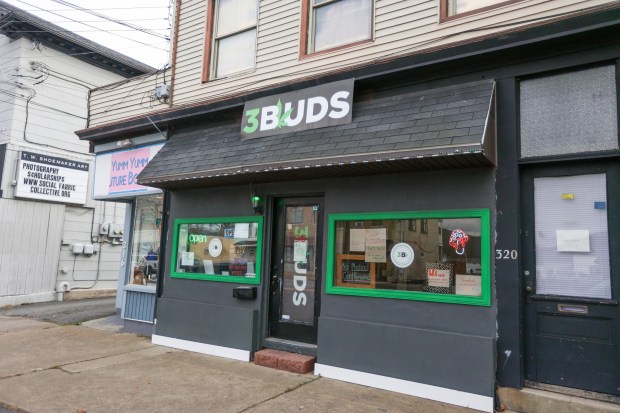 3BUDS in Wyoming on Wednesday, Nov. 19, 2025. (JASON ARDAN / STAFF PHOTOGRAPHER)
3BUDS in Wyoming on Wednesday, Nov. 19, 2025. (JASON ARDAN / STAFF PHOTOGRAPHER)
Emerging industry
The meteoric rise of Delta-8 and its ilk began with the 2018 farm bill, which removed hemp and derivatives of cannabis with low concentrations of Delta-9 THC from the definition of marijuana in the Controlled Substances Act.
That prompted the cannabis industry to begin selling products containing less than 0.3% Delta-9 THC but with total THC concentrations above 0.3%, according to a congressional report released in August.
While marijuana remained illegal under federal law, the bill created uncertainty about which cannabis products were legally considered hemp, according to the report.
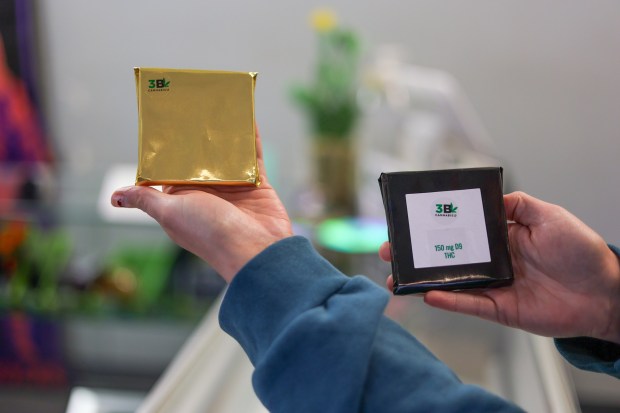 THC-infused Dubai chocolate bars at 3BUDS in Wyoming on Wednesday, Nov. 19, 2025. (JASON ARDAN / STAFF PHOTOGRAPHER)
THC-infused Dubai chocolate bars at 3BUDS in Wyoming on Wednesday, Nov. 19, 2025. (JASON ARDAN / STAFF PHOTOGRAPHER)
As a result, a booming industry emerged and began openly selling hemp flower, vapes and edibles that provide users with intoxicating effects similar to — and oftentimes more potent than — actual marijuana.
Earlier this month — before Congress voted on the legislation to crack down on such products — Attorney General Dave Sunday joined prosecutors in 38 other states seeking clarification of the definition of “hemp” in an effort to stem the sale of “unregulated and intoxicating” products containing cannabinoids such as Delta-8 and Delta-10.
“For too long, bad actors have used the loophole in the 2018 Farm Bill to profit from super-potent, hemp-derived THC products by placing them in gas stations, convenience stores, and online marketplaces,” Sunday said at the time. “This unregulated market allows children to buy these extremely potent products, oftentimes without any knowledge that the products are intoxicating, addictive, and not safe.”
Sunday noted that such products are often packaged to appeal to children, imitating labeling from candy or sodas, and are often sold without consistent age restrictions, labeling standards or safety requirements.
Sitler — who is also co-owner of Endo, a hemp-infused beverage company in Lancaster that utilizes “naturally derived cannabinoids” rather than Delta-8 — acknowledged that there is a problem with some manufacturers marketing products such as Delta-8 to youths, but he said the solution should be to increase regulation, not to ban the products altogether.
“This isn’t just intoxicating hemp products or bad players. This literally is taking away grandma’s CBD tincture now,” Sitler said. “We just want to provide plant-based medicine to people in a safe format in ways that are not over-regulated but are regulated enough that people are protected.”
According to the U.S. Hemp Roundtable, a nationwide hemp business advocacy group, the recent legislation will ban more than 95% of all hemp extract products. Although products containing less than 0.4 milligrams of total THC per container will still be allowed, the group says such “niche items are very rare.”
Sitler agreed that the .4-milligram limit amounts to an effective ban on most products.
“This whole claim that it’s just removing bad actors is a total lie,” Sitler said. “It’s literally just destroyed the whole entire cannabinoid sector of the industry, from farms to processors to retailers to manufacturers — a $30 billion industry destroyed in one year.”
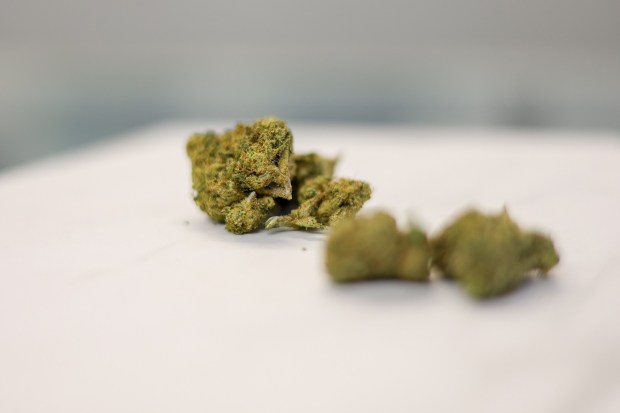 THC-A flowers available at 3BUDS in Wyoming on Wednesday, Nov. 19, 2025. (JASON ARDAN / STAFF PHOTOGRAPHER)
THC-A flowers available at 3BUDS in Wyoming on Wednesday, Nov. 19, 2025. (JASON ARDAN / STAFF PHOTOGRAPHER)
‘Nightmare for law enforcement’
While those in the hemp industry oppose the change, many in law enforcement welcomed the news.
Luzerne County District Attorney Sam Sanguedolce said he was in favor of the change in part because of “the ambiguity surrounding Delta-8 content itself.”
“More importantly,” he added, “the law defined hemp as having under 0.3% THC; however, when you heat it up, the levels increase making it illegal.”
Kingston Police Chief Richard Kotchik, a longtime narcotics investigator, said the Delta-8 boom in gas stations has been a “nightmare for law enforcement” and that he supports efforts to keep such products out of the hands of kids.
“That’s a huge win for putting sanctions on exactly what these stores are selling,” Kotchik said. “These gas stations are selling to whoever they want. It’s very, very hard to monitor.”
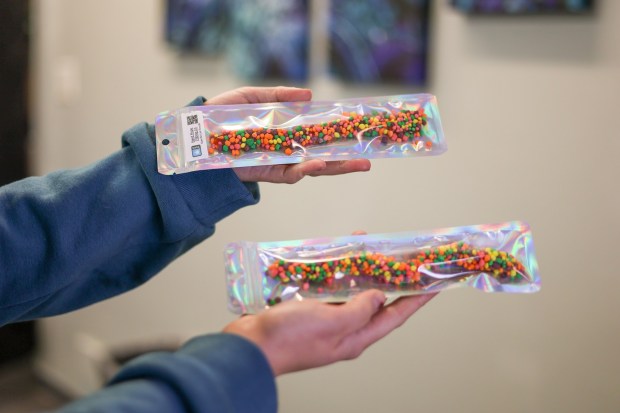 THC-infused Nerd Ropes available at 3BUDS in Wyoming on Wednesday, Nov. 19, 2025. (JASON ARDAN / STAFF PHOTOGRAPHER)
THC-infused Nerd Ropes available at 3BUDS in Wyoming on Wednesday, Nov. 19, 2025. (JASON ARDAN / STAFF PHOTOGRAPHER)
Kotchik said he views marijuana as a gateway drug, especially when youths are involved. While he said he does believe marijuana can have medicinal benefits, Kotchik also said it creates issues for law enforcement in a variety of ways, from DUI enforcement to preventing contraband from entering area schools.
“We have a lot of issues with it now,” he said. “We’re now having trouble getting dogs trained in marijuana because of the legalizations. And the problem with that is I need these marijuana-trained dogs for schools.”
Because of the youthful marketing for many such products, neither Kotchik and Sanguedolce said they expected the change in the law to drive many customers to surrounding states in search of them.
“I’m personally not very concerned that people may go out of state for their THC products,” Sanguedolce said. “I don’t see it as much different than going out of state for recreational marijuana or going to Delaware for tax-free. It’s unlikely that this clarification will put these shops out of business.”
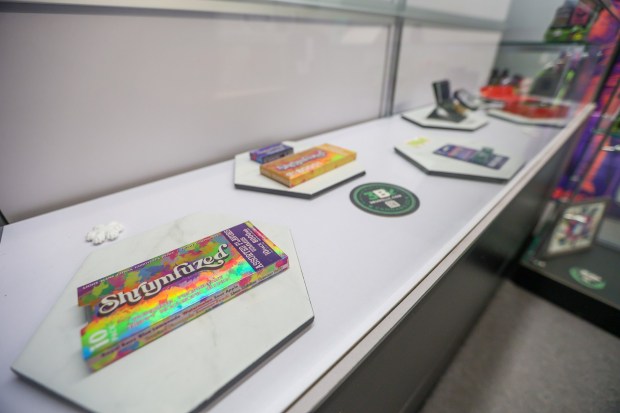 Mushroom infused products available at 3BUDS in Wyoming on Wednesday, Nov. 19, 2025. (JASON ARDAN / STAFF PHOTOGRAPHER)
Mushroom infused products available at 3BUDS in Wyoming on Wednesday, Nov. 19, 2025. (JASON ARDAN / STAFF PHOTOGRAPHER)
‘Joining the fight’
At the 3BUDS dispensary at 318 Wyoming Ave. in Wyoming Borough, the hemp-derived products are laboratory tested and are not sold in the cartoonish packaging associated with gas station cannabis products.
“Pretty much all of our packaging is standard,” Smetana said, adding that the company also employs childproof protections. “That’s just our own kind of self-policing that we’ve done in the industry. … A lot of the companies that pride themselves in it and believe that there should be stricter regulation just hold themselves to the standards of the marijuana industry.”
While he acknowledged that there is “definitely some sketchy product out there,” he said he does not think the solution should be an outright ban.
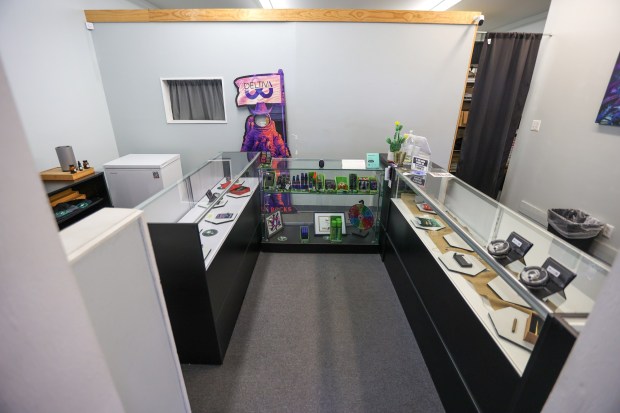 An interior view of 3BUDS in Wyoming on Wednesday, Nov. 19, 2025. (JASON ARDAN / STAFF PHOTOGRAPHER)
An interior view of 3BUDS in Wyoming on Wednesday, Nov. 19, 2025. (JASON ARDAN / STAFF PHOTOGRAPHER)
“I think the biggest problem is they’re going from little to no regulation to just trying to completely close it off. I think there definitely should be some enhanced regulation on the market,” Smetana said. “THCA is a huge part of our market. We did originally start in just the CBD realm of things, but if they completely close this and there’s no other options I personally don’t think that we will be able to maintain our business.”
For the next year, before the change takes effect, Smetana said the company intends on “joining the fight in any way we can” and to push lawmakers to reconsider the change.
“If they see enough of an uprising against it and realize the economic harms, then hopefully we’ll be able to stop that deadline,” he said. “We would rather get stricter regulations and more government oversight than to just end the hemp industry altogether.”
Sitler echoed that sentiment. He noted that polls have shown that a majority of Pennsylvania voters support legalizing recreational marijuana and he called on them to reach out to their representatives.
“If people are passionate about it, they should contact their local representative and tell them how they feel,” Sitler said. “As Pennsylvanians, if we want access to these products, we need to stand up and fight for them.”

